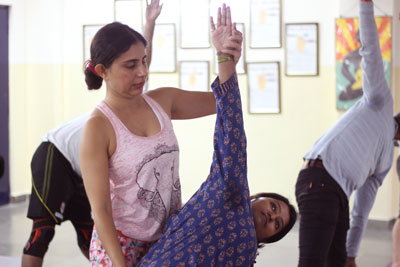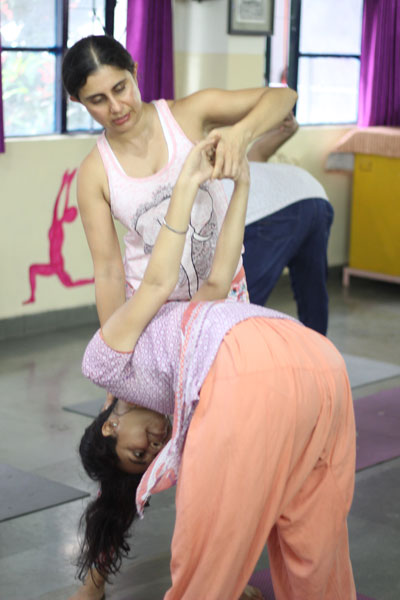At Eka we work with multiple therapy techniques to address both mental and physical wellness. Some of the therapy techniques that we use are:
- Yoga Therapy
- Cognitive Behavioural Therapy
- Reiki Therapy
 Yoga therapy at Eka, is a type of therapy that uses yoga postures, breathing exercises, meditation, and guided visualization / imagery to improve mental and physical health. The holistic focus of yoga therapy encourages the integration of mind, body, and spirit. Modern yoga therapy treatment covers a broad range of therapeutic modalities, incorporating elements from both physical therapy and psychotherapy.
Yoga therapy at Eka, is a type of therapy that uses yoga postures, breathing exercises, meditation, and guided visualization / imagery to improve mental and physical health. The holistic focus of yoga therapy encourages the integration of mind, body, and spirit. Modern yoga therapy treatment covers a broad range of therapeutic modalities, incorporating elements from both physical therapy and psychotherapy.
Yoga therapy is a growing field and scientific evidence has begun to emphasize its effectiveness. It is used to treat existing mental and physical health issues, but can also be used as a self-care regime for prevention and maintenance.
At Eka, Yoga Therapy is well established as a treatment for conditions like:
Mental Health
Physical Health
Mental Health conditions like:
Anxiety
Depression
Stress
Addictions / Substance abuse
Post Traumatic Stress Disorder (PTSD)
Given yoga’s focus and concentration on the integration of mind and body, we believe that Yoga Therapy can also be used effectively to address:
Physical Health conditions like:
Back pain
Shoulder and Neck pain
Joint pain
Heart Conditions
Asthma
Chronic fatigue
Sciatica pain
Hypertension
Multiple Sclerosis
Practice and benefits of Yoga Therapy
 Yoga therapy is rooted in the ancient practice of yoga, which originated thousands of years ago in India. Yoga therapy is practiced in a wide range of formats. Physical therapists, for example, often implement yoga techniques in their delivery of yoga postures and/or sequences, along with other therapies. A yoga therapy practice can resemble physical therapy, rehabilitative therapy, and/or psychotherapy. Unlike a standard yoga class, yoga therapy sessions are typically conducted in a one-on-one or a small group format.
Yoga therapy is rooted in the ancient practice of yoga, which originated thousands of years ago in India. Yoga therapy is practiced in a wide range of formats. Physical therapists, for example, often implement yoga techniques in their delivery of yoga postures and/or sequences, along with other therapies. A yoga therapy practice can resemble physical therapy, rehabilitative therapy, and/or psychotherapy. Unlike a standard yoga class, yoga therapy sessions are typically conducted in a one-on-one or a small group format.
Yoga therapy can be provided as an adjunct therapy to compliment other forms of treatment, or it can be used to directly treat a specific issue. Yoga techniques range from simple to advanced and can be enjoyed by people of all ages.
Benefits of Yoga Therapy
 The potential benefits of yoga therapy include:
The potential benefits of yoga therapy include:
Stress reduction
Overall relaxation
Psychological well-being
Physical well-being
Effective functioning of bodily systems
Reduced anxiety levels
A sense of overall calmness
Improves mindfulness
Expectations from Yoga Therapy
When a person decides to initiate yoga therapy, the therapist will first conduct an initial assessment. This assessment is designed to do the following:
Identify health problems
Assess lifestyle and physical capability
Discuss reasons for seeking therapy
Create a course of treatment
Once the treatment plan is established in this first consultation, the frequency of sessions is agreed upon and sessions are scheduled. From this point, therapy sessions will most likely include the following components:
Prayanama (Breathing Techniques): The therapist will guide the person in therapy through a series of breathing exercises ranging from energizing breaths to balancing breaths.
Asanas (Physical Postures): The therapist will teach the person in treatment appropriate yoga poses that address problem areas. For example, the “Legs Up the Wall” pose is used to treat things like, varicose veins, anxiety and insomnia. In this pose, the person lays on his or her back with legs positioned up against the wall.
Meditation (Mindfulness): Relaxation and mindfulness techniques are the focus of meditation. These are combined with yoga postures.
Guided visualization: Through this technique the yoga therapist attempts to calm the body and mind by providing guided instructions and imagery intended to bring inner peace.
Personal Practice: An important element of yoga therapy is to find a way to incorporate what has been learned into ones daily life. Yoga therapists provide instructions on how to use what has been learned in treatment sessions, at home.
Cognitive behavioural therapy (CBT) is a type of psychotherapeutic treatment that helps people learn how to identify and change destructive or disturbing thought patterns that have a negative influence on behaviour and emotions.
Cognitive behavioural therapy focuses on changing the automatic negative thoughts that can contribute to and worsen emotional difficulties, depression, and anxiety. These spontaneous negative thoughts have a detrimental influence on mood.
Through CBT, these thoughts are identified, challenged, and replaced with more objective, realistic thoughts.
Types of Cognitive Behavioural Therapy :
CBT encompasses a range of techniques and approaches that address thoughts, emotions, and behaviours. These can range from structured psychotherapies to self-help materials. There are a number of specific types of therapeutic approaches that involve CBT, including:
Cognitive therapy centers on identifying and changing inaccurate or distorted thinking patterns, emotional responses, and behaviours.
Dialectical behaviour therapy (DBT) addresses thoughts and behaviours while incorporating strategies such as emotional regulation and mindfulness practices.
Rational emotive behaviour therapy (REBT) involves identifying irrational beliefs, actively challenging these beliefs, and finally learning to recognise and change these thought patterns.
While each type of cognitive behavioural therapy takes a different approach, all work to address the underlying thought patterns that contribute to psychological distress.
Techniques
CBT is about more than identifying thought patterns; it is focused on using a wide range of strategies to help people overcome these thoughts. Techniques may include journaling, role-playing, relaxation techniques, and mental distractions.
Identifying Negative Thoughts
Practicing New Skills
Goal-Setting
Problem-Solving
Self Monitoring
What CBT Can Help With
Cognitive behaviour therapy can be used as a short-term treatment to help individuals learn to focus on present thoughts and beliefs.
CBT is used to treat a wide range of conditions including:
Depression
Anxiety
Addictions
Anger issues
Panic attacks
Personality disorders
Phobias
Bipolar Disorder
Cognitive Dissonance
In addition to mental health conditions, CBT has been found to help people cope with the following:
Chronic pain
Serious illnesses
Divorce or break-ups
Grief or loss
Insomnia
Low self-esteem
Relationship problems
Stress Management
Benefits of CBT
The underlying concept behind CBT is that thoughts and feelings play a fundamental role in behavior.1 For example, a person who spends a lot of time thinking about plane crashes, runway accidents, and other air disasters may avoid air travel as a result.
The goal of cognitive behaviour therapy is to teach people that while they cannot control every aspect of the world around them, they can take control of how they interpret and deal with things in their environment.
It allows you to engage in healthier thinking patterns by becoming aware of the negative and often unrealistic thoughts that bring your down
It has been found to be effective online as well as face-to-face.
If you are interested in exploring any of the above therapy treatments for mental or physical condition, please do contact us at or call us on +91-98713-84075 to schedule an appointment.